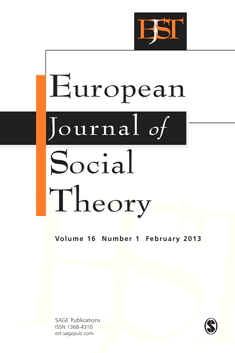
European Journal of Social Theory
Scope & Guideline
Shaping critical thought in sociology and political science.
Introduction
Aims and Scopes
- Critical Theory and Contemporary Capitalism:
The journal frequently engages with critical theoretical perspectives to analyze contemporary capitalism, exploring its implications for society, power dynamics, and resistance. - Migration and Mobility Studies:
There is a strong emphasis on migration theories, examining how mobility shapes social structures and individual experiences, often through a poststructuralist lens. - Interdisciplinary Approaches:
The journal encourages interdisciplinary methodologies, integrating insights from sociology, political science, anthropology, and cultural studies to enrich social theory. - Ecological and Environmental Sociology:
Recent publications highlight the intersection of social theory with ecological concerns, particularly in the context of the Anthropocene and environmental justice. - Decolonial and Postcolonial Perspectives:
The journal incorporates decolonial and postcolonial critiques, addressing the impacts of colonial histories on contemporary social theory and practices. - Theoretical Innovations:
It fosters theoretical innovations that challenge traditional paradigms, such as rethinking concepts of power, agency, and social order in light of current global challenges.
Trending and Emerging
- Digital Society and Technology Critique:
Recent publications increasingly address the implications of digital technologies and capitalism, exploring concepts like techno-feudalism and platform capitalism, highlighting the need for critical engagement with digital society. - Ecological Social Theory:
There is a growing emphasis on ecological frameworks within social theory, as scholars examine the interconnections between social structures and environmental issues, particularly in the context of climate change. - Migration as a Fundamental Social Process:
The discourse around migration has expanded, with a focus on understanding migration not just as an event but as a fundamental aspect of contemporary social theory and societal constitution. - Future Studies and Speculative Social Theory:
Emerging themes include explorations of futurism and speculative social theory, reflecting a growing interest in how societies envision and prepare for potential futures amid uncertainty. - Intersectionality and Social Justice:
Intersectional analyses that address multiple axes of identity (such as race, gender, and class) are gaining traction, reflecting a commitment to social justice and inclusivity in theoretical discussions.
Declining or Waning
- Classical Sociological Theories:
There seems to be a decline in focus on classical sociological theories, such as those by Durkheim and Weber, as contemporary discussions increasingly prioritize modern critiques and emerging frameworks. - Traditional Political Ideologies:
Themes centered around traditional political ideologies, such as democratic socialism and liberalism, are less frequently addressed in favor of more nuanced discussions on postliberalism and new political movements. - Methodological Individualism:
There is a noticeable reduction in publications emphasizing methodological individualism, as the journal increasingly favors collective and structural approaches to understanding social phenomena. - Eurocentric Perspectives:
As the journal embraces more global and decolonial viewpoints, Eurocentric frameworks are becoming less prominent, reflecting a broader trend towards inclusivity in social theory. - Static Views on Social Movements:
The analysis of social movements appears to be evolving from static perspectives to more dynamic, context-sensitive approaches that account for the fluidity and complexity of contemporary activism.
Similar Journals
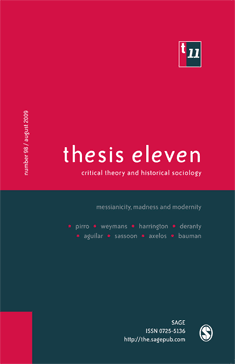
Thesis Eleven
Exploring the intersections of culture, history, and society.Thesis Eleven is a prestigious peer-reviewed journal published by SAGE Publications Ltd, focusing on critical inquiries across the disciplines of cultural studies, history, political science, and sociology. With an ISSN of 0725-5136 and an E-ISSN of 1461-7455, this journal has played an influential role in shaping scholarly discourse since its inception in 1980, with its convergence years extending to 2024. Recognized for its rigorous research, it holds a Q1 ranking in both Cultural Studies and History, demonstrating its impact and relevance in these fields. Furthermore, it is noted for its significant contributions to political science and sociology, holding a Q2 ranking in these categories as of 2023. Despite its non-open access model, the journal is committed to providing valuable insights and fostering academic debate, making it an essential resource for researchers, professionals, and students alike, eager to explore developments and emerging dialogues in the humanities and social sciences. With its London base at 1 Olivers Yard, 55 City Road, London EC1Y 1SP, England, Thesis Eleven continues to be a pivotal platform for interdisciplinary scholarship.

ANTHROPOLOGICAL QUARTERLY
Advancing Ethnographic Insights for TomorrowANTHROPOLOGICAL QUARTERLY, published by the George Washington University Institute of Ethnographic Research, stands as a vital resource in the field of anthropology and broader arts and humanities studies. With an ISSN of 0003-5491 and an E-ISSN of 1534-1518, this esteemed journal has been contributing to academic discourse since its establishment in 1981. The journal holds a respected position in both the Q2 category for Anthropology and the Q2 category for Arts and Humanities (miscellaneous), demonstrating its impact and relevance, as evidenced by its rank of #152 out of 502 in the Social Sciences sector for anthropology and rank of #179 out of 552 in the Arts and Humanities field. Researchers, professionals, and students can rely on ANTHROPOLOGICAL QUARTERLY for rigorous peer-reviewed articles that push the boundaries of ethnographic research and anthropological theory, addressing contemporary issues with scholarly precision. The journal’s commitment to fostering critical analysis and interdisciplinary perspectives establishes it as an essential platform for advancing knowledge within its diverse and dynamic field.
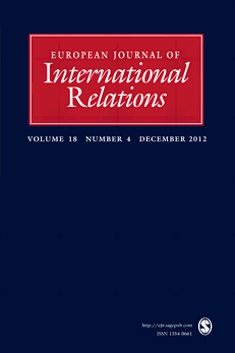
EUROPEAN JOURNAL OF INTERNATIONAL RELATIONS
Illuminating the pathways of global interconnections.The EUROPEAN JOURNAL OF INTERNATIONAL RELATIONS (ISSN: 1354-0661, E-ISSN: 1460-3713), published by SAGE Publications Ltd, stands as a prestigious conduit for innovative scholarship in the fields of Political Science and International Relations. Launched in 1995, this esteemed journal has carved a significant niche within the academic community, achieving a remarkable Q1 ranking for both Political Science and Sociology in 2023, along with an impressive Scopus rank, placing it within the top 5% of its category. This journal is committed to advancing rigorous analysis and fostering critical discourse on global interrelations, offering researchers, professionals, and students a platform for high-quality empirical and theoretical studies. Although it does not provide open access, the journal’s curated selection of articles, reviews, and original research continues to make it a vital resource for understanding the complexities of international relations in a contemporary context. As it converges through the years up to 2024, EUROPEAN JOURNAL OF INTERNATIONAL RELATIONS remains an essential reference for those striving to contribute to or engage with critical knowledge in the evolving landscape of global politics.

AMERICAN SOCIOLOGIST
Unveiling Contemporary Issues in SociologyAMERICAN SOCIOLOGIST is a prominent academic journal published by SPRINGER, representing a vital resource in the fields of sociology and political science. With an ISSN of 0003-1232 and an E-ISSN of 1936-4784, this journal has contributed significantly to the sociological literature since its inception, offering insights that challenge conventional thought and stimulate critical discussion. The journal has maintained its relevance throughout various converged years, ensuring a comprehensive exploration of sociological topics from 1973 to 2024. Currently, it holds a commendable status in the second quartile (Q2) within both Social Sciences (miscellaneous) and Sociology and Political Science categories, reflecting its robust impact and academic influence, with Scopus ranks placing it in the 52nd percentile across its fields. Though it operates under a subscription model, the journal provides crucial access for researchers, professionals, and students keen on uncovering contemporary issues and advancements in sociology. With its dedication to fostering an understanding of complex societal dynamics, AMERICAN SOCIOLOGIST is an essential platform for disseminating pioneering research and innovative ideas that shape our understanding of social phenomena.
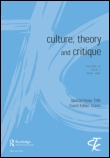
Culture Theory and Critique
Challenging Boundaries in Cultural Theory and AnalysisCulture Theory and Critique, published by Routledge Journals, Taylor & Francis Ltd, is a pivotal journal that serves as a conduit for interdisciplinary research and discourse in the realms of Cultural Studies, Sociology, and Political Science. With an ISSN of 1473-5784 and E-ISSN 1473-5776, this journal has carved a niche for its innovative exploration of cultural phenomena and their socio-political implications. According to the latest metrics, it holds a notable position within the academic landscape, ranked Q2 in Cultural Studies and Q3 in Sociology and Political Science as of 2023. With a Scopus rank placing it in the 78th percentile for Cultural Studies, the journal not only contributes significantly to scholarly dialogue but also offers a critical platform for emerging theories and critiques from diverse perspectives. Although it operates under a standard access model, the journal encourages submissions that push the boundaries of current knowledge and engage with pressing cultural issues. Researchers, professionals, and students alike will find that Culture Theory and Critique is essential for fostering a deeper understanding of the dynamic interplay of culture and society, and it stands as a testament to the evolving landscape of cultural analysis.

Contemporanea-Revista de Sociologia da UFSCar
Advancing sociological discourse for a global audience.Contemporanea-Revista de Sociologia da UFSCar is a leading academic journal published by the Department of Sociology at the Federal University of São Carlos, Brazil. With an ISSN of 2236-532X and an E-ISSN of 2316-1329, this journal has established itself as a significant platform for the dissemination of sociological research since it became Open Access in 2011. The journal aims to foster innovative discussions and provide scholarly insights that align with contemporary sociological trends, thus attracting a diverse readership comprising researchers, professionals, and students alike. By addressing crucial social issues and promoting interdisciplinary dialogue, Contemporanea plays a vital role in advancing sociological knowledge and inquiry in an increasingly complex world. Its commitment to accessibility ensures that valuable research findings are available to a global audience, enhancing the impact of sociological studies across borders.
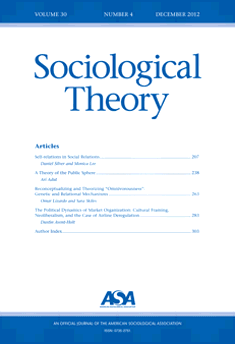
SOCIOLOGICAL THEORY
Exploring contemporary issues with rigorous theoretical frameworks.Sociological Theory, published by SAGE Publications Inc, is a premier journal dedicated to advancing the field of sociology through innovative theoretical approaches and empirical research. With an impressive impact factor and recognized as a Q1 journal in both Sociology and Political Science, it ranks 86 out of 1466 in its category, placing it in the 94th percentile according to Scopus metrics. This journal seeks to foster rigorous debate and insight on contemporary sociological issues, welcoming contributions that challenge existing paradigms and offer new perspectives. Founded in 1996, Sociological Theory continues to push the boundaries of sociological inquiry through its commitment to quality and relevance, making it an essential resource for researchers, professionals, and students alike. Based in the United Kingdom, this journal is not an open-access publication, but it remains widely accessible through institutional subscriptions, ensuring that its valuable content reaches a global audience interested in the dynamics of social life.
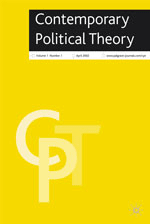
Contemporary Political Theory
Engaging Minds on the Cutting Edge of Political TheoryContemporary Political Theory, published by Palgrave Macmillan Ltd, stands as a leading journal in the field of Political Science and International Relations, as well as Sociology. With an impressive impact factor and a solid position within the top quartiles (Q1) of its categories based on the 2023 rankings, this journal is dedicated to advancing scholarly debates and providing innovative insights into political theory. With an enriching scope that spans from 2009 to 2024, it publishes peer-reviewed articles that explore contemporary political dynamics, theoretical frameworks, and interdisciplinary perspectives. Aimed at researchers, professionals, and students alike, the journal invites contributions that challenge conventional wisdom and foster critical discourse in a rapidly evolving global landscape. Access options are available through various academic platforms, making this journal an essential resource for anyone invested in understanding the complexities of modern political thought and practice.

AMERICAN ETHNOLOGIST
Connecting Communities Through Scholarly DiscourseAMERICAN ETHNOLOGIST, published by Wiley, stands as a prominent platform in the field of anthropology, with a distinguished reputation underscored by its Q1 ranking in the 2023 Category Quartiles and a notable position in the 79th percentile among its peers. With its foundation dating back to 1974 and set to continue until 2024, this journal serves as a vital resource for researchers, practitioners, and students devoted to exploring cultural dynamics and social practices across diverse communities. The journal is characterized by its commitment to advancing theoretical discussions and empirical scholarship in ethnology and related disciplines. Targeted contributions include in-depth studies, critical reviews, and innovative methodologies that engage with pressing cultural issues. Although it does not offer Open Access, the journal’s rigorous peer-review process and high-impact articles ensure the dissemination of valuable insights, enhancing scholarly engagement and professional discourse. Its ISSN is 0094-0496 and E-ISSN is 1548-1425, emphasizing its dual format accessibility, which facilitates wider readership within the anthropology community.

Osterreichische Zeitschrift fuer Soziologie
Advancing the Frontiers of Sociological InquiryOsterreichische Zeitschrift fuer Soziologie is a prominent academic journal published by Springer Vieweg-Springer Fachmedien Wiesbaden GmbH, based in Switzerland. With an ISSN of 1011-0070 and E-ISSN 1862-2585, this journal serves as a vital platform for advancing scholarship in the field of sociology. It is categorized in the Q3 quartile for Social Sciences (miscellaneous) in 2023, demonstrating its role in contributing to the broader academic discourse. With convergence years spanning from 2001 to 2024, the journal provides a wealth of research articles that address contemporary sociological issues, trends, and theoretical developments. While primarily subscription-based, the journal maintains rigorous academic standards, making it a valuable resource for researchers, professionals, and students seeking to deepen their understanding of social dynamics. Its position in the Scopus rank reflects its commitment to fostering quality scholarship, ranked #167 out of 275 in the General Social Sciences category. Engage with this esteemed publication to stay informed about the latest developments in sociology.